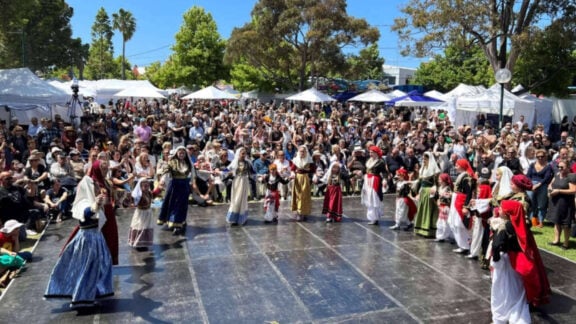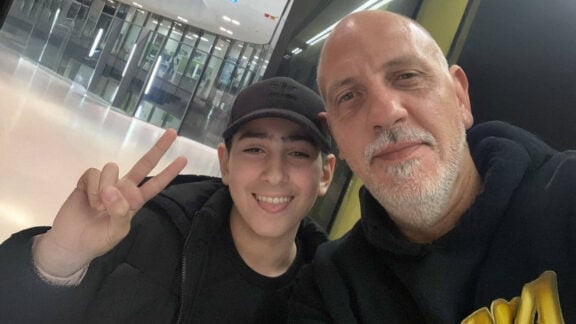Australia is facing a crisis of domestic and sexual violence — the number of women killed by an intimate partner reached a record high in 2024—an alarming average of two women per week.
Despite government funding, policy changes, demonstrations, and rallies, it seems that this social crisis needs to be addressed in a new light, with collaboration from all sectors of society.
The Hellenic Chamber of Commerce and Industry (HACCI), aligned with UN Women Australia’s theme for International Women’s Day March Forward, inviting two female leaders —Professor Kate Fitz-Gibbon, Chair of Respect Victoria and Sylvia Hadjiantoniou, CEO of PRONIA —who are at the forefront of calling for systemic change, to lead the conversation about the barriers to progress and how they can be addressed. Prof Fitz-Gibbon is an internationally renowned scholar and advocate dedicated to preventing violence against women and children and Hadjiantoniou is a passionate advocate for social justice, community development, and social equity.
Moderating the discussion in the packed hall at the HACCI International Women’s Day event on Monday, was Professor Alex Christou, Director of Corporate Education and Strategic Partnerships at Monash Business School, and a recognised expert in workplace well being, gender-based violence, and employee support.

Less than 10 per cent of cases of domestic violence are reported to the police, and of those, only 1% result in a court conviction
“When we look at the horrific statistics, we know that it is the tip of the iceberg of a significant problem that is sitting across every single corner of the community,” Prof Fitz-Gibbon said and added that the COVID-19 pandemic accelerated the crisis in every aspect.
Australia faces challenges on multiple fronts—cost of living and housing shortages which feed into the cycle of domestic and sexual violence said Prof Fitz-Gibbon. The professor welcomed the fact that Violence Against Women was put on the national cabinet agenda for the first time. Yet, the sobering statistic, a 42 per cent rise in domestic violence calls to the police during AFL nights, and grand finals, she said we need to confront the reality that Australia has embedded violence alongside sports in its culture.
Domestic violence is a social pandemic
Hadjiantoniou works on the frontline and paints a grim picture of the increase in domestic violence cases and highlighted that it is a “real social crisis in terms of the victims coming through the doors of PRONIA”.
When someone comes for help their individual needs are assessed by the team at PRONIA, and support is provided, be it financial, legal, psychological, or the provision of safe housing through the organisation’s partners. When children are involved, they are also supported.
However, Hadjiantoniou noted the broader trend of rising violence in our community, and the gaps that remain in culturally sensitive services for diverse communities.
There are systemic barriers that stop members of our Greek community from seeking help
Hadjiantoniou said that apart from the financial aspects and safe housing- “there’s also a huge taboo within our culture around this issue”.
The idea she said that “this is not to be talked about. It is a private matter”.
She said that she often meets women who feel such shame and embarrassment about their predicament.
“Greek Australian women, now in their 70s, are probably only just finding their voice after experiencing violence back in the day, but didn’t recognise it as such, because it was normalised”, she added.

There is progress but not nearly as fast as we would like
Prof Fitz-Gibbon, discussed the launch of the 2022 National Plan to End Violence Against Women, which aims to eliminate gender-based violence within a generation. Supported by all Australian governments, it guides funding and services across prevention, early intervention, crisis response, and, for the first time, recovery and healing for victim-survivors.
“The violence is preventable. We’re always driving towards taking the burden off frontline services, to moving earlier and earlier in the process. The ultimate goal is prevention.”
NSW introduced the first legislation criminalising coercive control in Australia in June last year, and Queensland and South Australia, are both working towards that same goal.
As the Chair of Respect she said how important it is for the justice system to understand violence as a pattern of abusive behaviours, rather than a single incident of violence.
These include a range of different tactics abusers use that may include physical violence, sexual violence, controlling, coercive, financial abuse, or stalking, intimidation and technology facilitated abuse. The police also need to be trained across the spectrum to identify, investigate and properly prosecute a pattern of abusive behaviours.
Many ask: “If is so hard, why doesn’t she leave?”
The reality is, Hadjiantoniou said, that “women experiencing this situation feel they have an anchor around their neck”. They feel they could at any moment be hurt physically, even killed, and that their children will suffer for it.
On average, it takes a woman seven to eight attempts to leave an abusive relationship. The cost of that decision is staggering. Dr Fitz-Gibbon referred to the Research by the Champions of Change coalition in Australia that found that escaping abuse requires approximately 121 hours of planning and a financial cost of around $40,000. The reality of leaving is even more daunting when they have children. A 2023 study revealed that most women who leave with their children are likely to experience poverty within five years of escaping domestic violence.
“That’s the choice that they’re making,” Prof Kate Fitz-Gibbon explains. “Do I stay and live in violence? Or do I take my children, make that incredibly courageous choice to leave, knowing that during the first three months after leaving, I’ll be also at an eight times higher risk of being killed by that partner.”
How workplaces can provide safety to women to come forward
With the introduction of paid domestic and family violence leave, workplaces in Australia now have a chance to be part of the solution. In Australia, all employees, including casual workers, can access up to 10 days of paid leave for domestic and family violence reasons.
Prof Fitz-Gibbon points to the incredible opportunity workplaces have to be part of addressing domestic and family violence.
“Think about all the time we spend at work. It is such an opportunity if we do all that awareness raising, training, teaching within workplaces -this will go back into their communities, back into their homes, and increase understanding. The potential for this legislation is huge.”
Legislation is important, but culture is absolutely imperative
But simply having the policy in place is not enough. If a workplace does not foster a culture of support and awareness, the leave might as well be meaningless. Employees need to know how the leave will be handled—who will have access to that information, whether it will appear on pay slips, and whether their total pay amount will remain unchanged to prevent alerting a controlling partner.
“Legislation is important, but culture is absolutely imperative.” Hadjiantoniou said that in practice, that aspect of the legislation is working well in PRONIA, but with the new services for recovery and healing “we could be doing better, offering culturally sensitive services for women that need it, who have got language barriers, who are dealing with taboos, along with everything else.”
While workplaces focus on supporting survivors, a growing conversation is emerging about how to handle perpetrators. Some companies are taking a bold step by allowing perpetrators to access domestic and family violence leave— as an opportunity to attend court hearings, police interviews, or behavioural change programs, which increases the likelihood that they will follow through with legal obligations.
“Research shows that men who can attend behaviour change programs during work hours are more likely to complete them,” Fitz-Gibbon added.
This issue is not just about women—it is about men and boys, too. Australia is facing a crisis in men’s mental health, with suicide rates, addiction, and imprisonment at alarming levels. Many young men feel they are constantly under scrutiny, unsure about their position and role in this dialogue to combat violence against women. To break the cycle, engagement with men and boys is crucial.
We are failing the children
Even though Australia is leading globally with policies designed to address domestic violence, Prof Fitz-Gibbon states that “we have not even scratched the surface in terms of what we need to do for children who have experienced domestic, family and sexual violence”.
“Children encounter systems that are designed by adults and with adults in mind and then we are surprised when their needs are not met.”
Many of these children have been exposed to domestic violence that is passed down from one generation to the next. “Some of these young children have grown up and are now the perpetrators themselves. We need to see how we can support them in managing their trauma,” Hadjiantoniou adds.

Despite the grim statistics, the Panel was hopeful
Hadjiantoniou sees greater understanding of the issue in our Greek community compared to when she was a child.”The fact that we’re having these difficult conversations gives me hope.”
“We must continue to talk about these issues until they stop being taboo. If we all work together—women, men, government organisations—to implement the legislation that is in place, with the crucial involvement of people with lived experience of domestic violence, this gives me hope.”
According to the 2024 National Community Attitudes Survey, more Australians than ever before recognise violence against women and children as a problem. “Concerningly, though over 40% think that it is not happening in their suburb, Prof Fitz-Gibbon said. “I think that takes us back full circle to the systemic barriers where communities just refuse to see that this is their problem too.”
By understanding that this is happening in every single corner of the Australian community, opportunities arise for people to reach out and to access help.
“We know that violence is a choice, and that’s why we can prevent it and this gives me hope.
“We conducted an important study last year examining 235 murders, and by looking at the history of each case, we found opportunities for intervention. And that’s why we hope that we can get better at identifying opportunities for intervention, opportunities to address risk, opportunities to offer safety.”
A responsibility for all men and women
Hadjiantoniou said that if one sees behaviour that is inappropriate, they need to speak up. “It takes courage but unfortunately, we have become accustomed to considering some inappropriate behaviours as normal, when they are not.”
Professor Alex Christou acknowledged the presence of several men in the audience and their willingness to get involved.
“Lets hold our mates to account when we see them, hear them disrespecting women – It all starts with disrespect. We must have these conversations, step up, and hold our friends accountable.”








